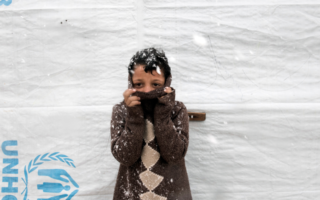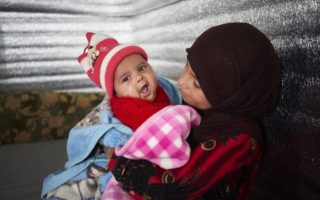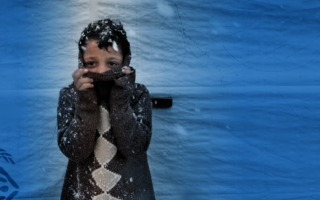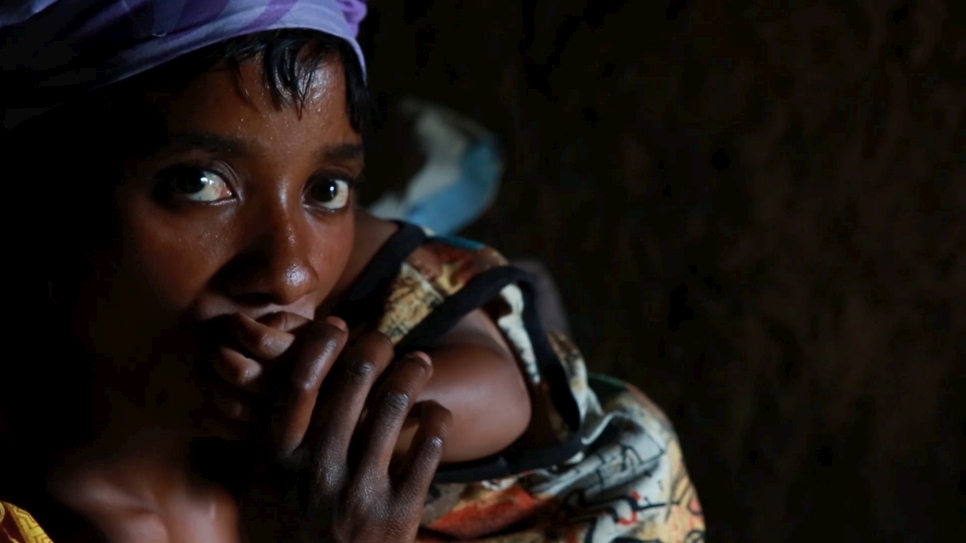
Congo’s internally displaced find strength in each other (Andreas Kirchhof, producer/ Linda Muriuki, producer/ Vania Turner, producer-editor/ Stephen Kibunja, editor/ Thomas Freteur, camera)
Displaced by ongoing attacks in conflict zones such as the DRC’s Ituri and North Kivu provinces, many families now live in makeshift shelters or temporary accommodation.
For those displaced by unrelenting conflict in the Democratic Republic of the Congo (DRC) the makeshift shelters they now live in are a far cry from the homes they have known and loved.
Divine, 21, fled her village in Djugu territory in Ituri earlier this year in February, together with her family. She shares a tent with seven relatives in a displacement site in Bunia, the provincial capital of Ituri.
“Our house has been burnt to the ground”, she says. “We saw it behind us as we were fleeing.”
João Sobral, a shelter expert with UNHCR, the UN Refugee Agency, working in Ituri at the time, recounts: “At the banks of Lake Albert I saw villages, where about half of the houses were destroyed. But in other villages, further away from the lake, everything was destroyed. Nothing was left, nothing!”
Odette had to flee her hometown in Rutshuru territory in the North Kivu province a few years ago due to insecurity. She first settled in Oicha, in the Beni territory of North Kivu with her husband and two children.
“Life was good in Oicha,” reflects the 38-year-old. “We had our own house.”
But the family’s quietude was short-lived. Two years later, she was forced to abandon her home again, after attackers came in the night.
“We heard gunshots and fled but they had killed my husband,” she says. “They looted our home and burnt it down.”
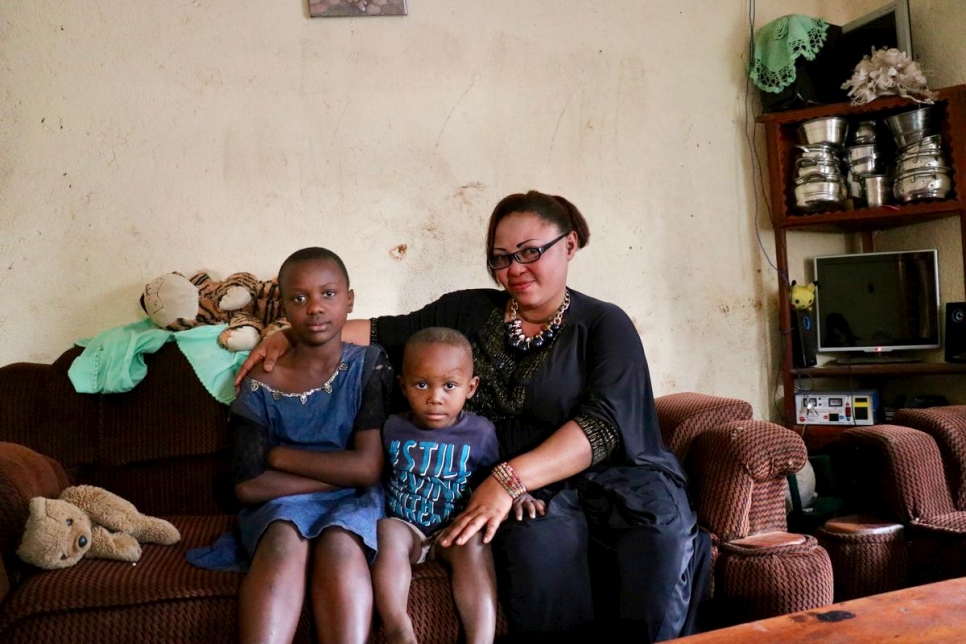
Odette, 38, with her two children, Nono, 12, and Prince 3. Due to violence and insecurity, the small family has had to flee their homes several times. They now live in the city of Beni. © UNHCR/Natalia Micevic
The small family then moved to the outskirts of Beni. After only a brief respite, violence and insecurity gripped their lives again and the family had to move once more after another attack.
“Armed men broke the windows of our house and started chopping off the heads of people in the neighbourhood.”
Like Divine and Odette, an estimated 1.5 million people have had their homes damaged or burned to the ground and their few possessions looted amidst ongoing violence in the DRC.
“Some of those forced to flee report entire villages having been reduced to ash,” said UNHCR spokesperson Charlie Yaxley in a statement earlier today. He added that in the two conflict-affected provinces of Ituri and North Kivu alone, an estimated 88,000 houses have been destroyed or damaged due to conflict.
“Some of those forced to flee report entire villages having been reduced to ash.”
This was the result of the latest of a series of assessments done this year by the UNHCR-led Shelter Working Group in DRC, to which several humanitarian organizations contributed data.
“Shelter is one of the most basic things people need when forced to flee their homes,” explains Sahdia Khan, UNHCR’s Shelter Coordinator in Kinshasa. “It means safety and security for people whose lives have been uprooted.”
Often forced to live in shelters without proper walls or the possibility to lock the doors, displaced people are at greater risk of harassment, assault or exploitation. Women and children are particularly exposed to sexual and gender-based violence while living in cramped spaces.
In Ituri, recent weeks have seen renewed attacks by often unidentified assailants on military positions and civilians. “I remember these small villages were everything had disappeared. The attackers had also destroyed all the basic infrastructure, the school buildings, the health posts were gone,” adds João.
In the Ebola-affected area near Beni, North Kivu, more than 1,300 cases of human rights violations against civilians have been recorded in the last three months, including physical attacks, indiscriminate killing, pillaging and kidnapping.
Besides physical security, having a roof over their heads also provides displaced people emotional security and comfort.
“A shelter is first and foremost a home, ” says Sahdia. “Having a place to come back to their families at a day’s end gives displaced people hope and a semblance of normal life.”
“I want to return, but I do not have the means to rebuild my house.”
While in emergency situations in DRC, UNHCR provides materials such as plastic sheeting and matting that can be used to make simple shelters, UNHCR supports wherever possible more durable construction, using traditional building materials. Rehabilitation of communal shelters or construction of new homes is carried out with provision for materials and cash needed to re-build houses under self-help schemes.
Over one million Congolese are now estimated to have been internally displaced in 2018. Pierre Mugisa is one among many who are waiting to return to their villages or cities of origin, but have to wait as the situation is still unstable.
“We have been here for almost six months. Our children do not go to school anymore,” said Pierre when talking to UNHCR earlier this year, pointing at the hundreds of shelters with plastic sheeting at a site for displaced persons in Bunia. “At home, our houses have been burnt down. I want to return, but I do not have the means to rebuild my house.”
UNHCR estimates not even one in five people in need will receive basic shelter assistance this year due to a severe lack of funding. Out of the US$201 million needed for UNHCR’s operations in the DRC this year, only 46 per cent has been received.
Returning home also seems out of reach for Odette.
“I would like to return to Oicha, but we sold our land there and insecurity is very high,” she said. “Here, we lack everything. Life is hard.”



